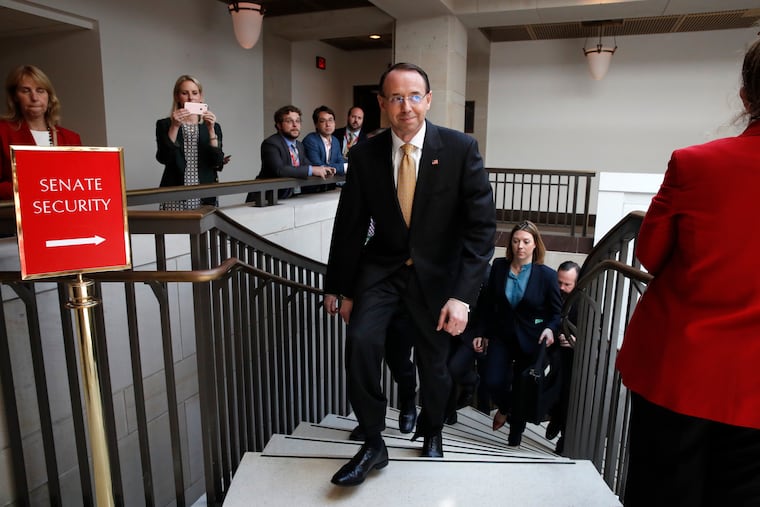After titillating IG report, Rod Rosenstein faces a major conflict | Michael Smerconish
It's hard to see how Rosenstein can fulfill his role as overseer of the Mueller probe. But easy to surmise that any obstruction case was just made that much harder.

It isn't that former FBI Director James Comey was correct not to charge Hillary Clinton.
Nor that Comey was insubordinate to Attorney General Loretta Lynch.
Not even that FBI agent Peter Strzok went as far as to say he'd stop President Trump from getting elected.
Those titillating findings and more were in inspector general Michael Horowitz's 500-plus-page report on the FBI's probe into Clinton's use of a private email server. But none of that was the most significant.
No, the long-lasting impact of the IG report will be the conflict it presents for Deputy Attorney General Rod Rosenstein when special counsel Robert Mueller wraps up his inquiry into President Trump's firing of Comey and the potential obstruction of justice of the FBI's investigation. Remember: Whether the president acted with the intention of thwarting a lawful investigation is at the core of Mueller's inquiry.
The president's detractors will say that Trump fired Comey to stop the Russian probe — including the investigation of Michael Flynn and the president himself — and that he admitted as much to Lester Holt and the Russian foreign minister and ambassador.
The president and his lawyers will respond that Trump had an unfettered right to fire Comey and that he did so based on a written recommendation from the Justice Department. Who wrote that recommendation? Rod Rosenstein.
Recall that it was Rosenstein, as deputy attorney general, who sent the memo to Attorney General Jeff Sessions on May 9, 2017, that provided the justification for Trump to fire Comey.
In the memo, Rosenstein was sharply critical of Comey's handling of the Clinton investigation, including: "… the Director ignored another long standing principle: we do not hold press conferences to release derogatory information about the subject of a declined criminal investigation."
Rosenstein also wrote: "The way the Director handled the conclusion of the email investigation was wrong. As a result, the FBI is unlikely to regain public and congressional trust until it has a Director who understands the gravity of the mistakes and pledges never to repeat them. Having refused to admit his errors, the Director cannot be expected to implement the necessary corrective actions."
That language sounds just like the scolding of Comey found in the recent IG report, which raises the question: How can Rosenstein remain the arbiter of what happens to Mueller's report on obstruction of justice given his central role in the president's firing of Comey? Even if the memo was just a pretext used by Trump, it was Rosenstein who wrote it, presumably in good faith. That will put Rosenstein in an untenable position as a fact witness regarding the president's defense.
Horowitz's testimony on Capitol Hill on Monday also gave fodder to the Rosenstein-backed theory that Comey was fired due to his handling of the email probe. Comey "clearly departed from FBI and Department norms, and his decisions negatively impacted the perception of the FBI and the Department as fair administrators of justice," according to the inspector general, who also said that Comey acted inappropriately in ways that confused rather than clarified the public's understanding of the FBI's recommendation.
"For Rosenstein, the IG report leaves him in a type of ethical zero-sum game," said Jonathan Turley, professor of law at George Washington University Law School. "Either Mueller is investigating Trump for obstruction in the Comey firing and Rosenstein has an unavoidable conflict or Mueller has rejected the obstruction theory and both Rosenstein and Trump are in the clear on that issue. Rosenstein could not continue in his position if Mueller was seriously pursuing the obstruction claim linked to the Comey firing."
"That raises a stark choice. Either Mueller is pursuing the obstruction claim and ignoring a huge conflict of interest, or he long ago decided that the Comey firing was not a viable obstruction claim. The fact that Rosenstein has not recused and the IG just reached the same conclusion on Comey's misconduct would suggest that the obstruction investigation has not focused on the Comey firing. If Mueller is pursuing the Comey firing as obstruction, he is doing so in total disregard of ethical standards."
It's hard to see how Rosenstein can fulfill his role as overseer of the Mueller probe. But easy to surmise that any obstruction case was just made that much harder.